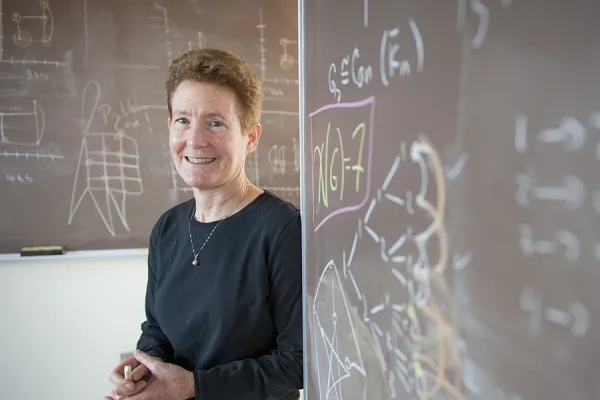Humphreys Prize Winner Ruth Haas Reflects on Mentoring Women in Mathematics
Research & Inquiry

Published November 14, 2014
Her colleagues say Ruth Haas, Achilles Professor of Mathematics and Statistics, has what it takes to spark a passion for the subject in her students.
“She is sensitive, caring—and tough,” says Jim Henle, Myra M. Simpson Professor of Mathematics and Statistics. “She has been an outstanding mentor to women in mathematics.”
In fact, Henle estimates that 7 percent of U.S. women who received Ph.D.’s in math from the nation’s top 100 universities last year were mentored by Haas.
Many of them came through Smith’s Center for Women in Mathematics, which Haas and Henle co-founded eight years ago. The center was the first in the nation to offer a post-baccalaureate program in mathematics when it was founded in 2005. Since then, a handful of similar programs have been founded across the country.
Haas’ track record of mentoring a significant proportion of the nation’s emerging women mathematicians is one reason the Association for Women in Mathematics selected her for this year’s prestigious Humphreys Award.
Named for Smith alumna Gweneth Humphreys ’33, the award honors teachers who support women in achieving their potential in mathematics—a field that has not traditionally been welcoming to women. Haas will receive her award in January at the association’s Joint Mathematics Meeting in San Antonio, Texas.
In an interview in the January 2013 issue of Insight, Haas recalled that she came to Smith 25 years ago because she wanted to be part of a college that valued teaching as well as research.
In that same story, Henle described how Haas is able to transform young women into “mature, confident, successful mathematicians.”
We caught up with Haas recently to find out more about her teaching and mentoring work. Here’s what she had to say:
What’s your secret to teaching math and encouraging women, in particular, to pursue an interest in the discipline?
Haas: “I think the key is to let the students know that it’s hard for you, too. People believe you either get math, or you don’t. But that’s just not true. All of us have to work at it. It comes as a revelation to students that teachers make mistakes. But you have to be willing to make mistakes to make progress.”
Where does that idea come from, that you either get math or you don’t?
Haas: “I’m not entirely sure. I think some of it has to do with language. If you go to France and you don’t understand every word, that’s seen as OK. But that doesn’t seem to be how people think about the language of mathematics. The idea that this isn’t something you’re just born knowing how to do takes some adjusting to—it means suspending your disbelief.”
What sparked your interest in mathematics?
Haas: “I’ve always had it, I guess. It was a big relief to me when I found out I could do math. That’s not to say that I didn’t have a hard time learning math. Being good at it was in part due to my obstinacy.”
What impact has Smith’s Center for Women in Mathematics had on the field?
Haas: “Our center is a hallmark program and the real reason I got the mentoring award. You hear about post-baccalaureate programs in medicine. But this is the first one in math. We’ve found that in graduate school, if you didn’t major in math you’re not really in shape for pursuing it in graduate school. The center offers a second opportunity for women who have graduated from college to spend a year at Smith taking classes and doing research that can help get them to graduate school. The first batch of students we worked with received their doctorates last year. In September we had our annual undergraduate conference and many of the alumnae were happy to come back and talk about their experiences with current students. It’s a way to make lasting connections in the field.”
How are things looking for women in mathematics?
Haas: “The situation is better, but the problems are not fixed. The higher up you go in the field, the lower the proportion of women. So math majors start out being 50/50 men and women. But then the proportion of women in the top 10 percent of graduate schools is lower, and the proportion of female faculty members in math is lower still. At every stage, women drop down or drop out. One of the things we’ve done at Smith is to build a strong community for women in mathematics.”
What does it mean for you to win the Humphreys Prize?
Haas: “It’s lovely! The prize is named for an alumna who got her master’s in math before we had a post-baccalaureate program. It’s a lovely parallel, getting an award named for someone who did what we’re trying to do now. My colleagues and former colleagues are doing things at Smith that are leading to student success. It all comes from that support.”